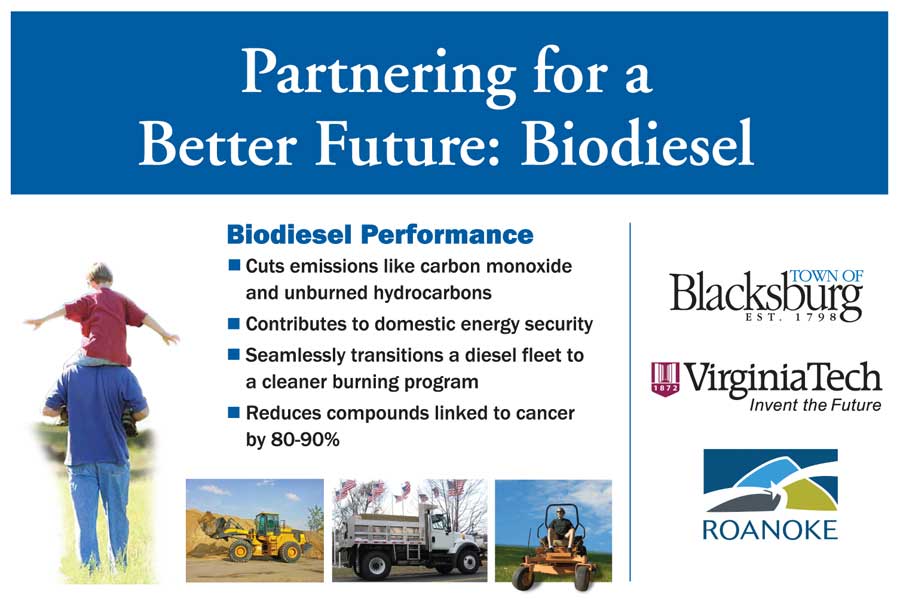Blacksburg, Roanoke, and Virginia Tech to use biodiesel fuel in vehicles and power equipment

Illustrating their commitment to sustaining the environment and reducing greenhouse gas emissions, the Town of Blacksburg, City of Roanoke, and Virginia Tech are converting their diesel fuel-powered public works and facilities vehicles and power equipment to biodiesel fuel—a cleaner-burning, renewable diesel fuel replacement made primarily from soybean oil.
To announce the initiative, the Town of Blacksburg, City of Roanoke and Virginia Tech will host an environmental celebration at 10 a.m. on Tuesday, April 17 in Blacksburg. The event will be held at the Five Chimney’s Lawn (corner of Washington Street and Draper Road). Roanoke Mayor Nelson Harris, Blacksburg Mayor Ron Rordam, and Larry Hincker, associate vice president for university relations at Virginia Tech will announce the biodiesel initiative.
In the event of inclement weather, the event will be held in the Blacksburg Police Department Training Room (200 Clay Street).
The biodiesel initiative is tied to the Town of Blacksburg and City of Roanoke’s membership in the International Council for Local Environmental Initiatives (ICLEI)—Local Governments for Sustainability. Members of ICLEI agree to complete a greenhouse gas emissions inventory, formulate an action plan for greenhouse gas mitigation, and implement the changes and monitor the resulting progress.
The City of Roanoke has converted 365 pieces of equipment – 100 percent of its diesel vehicles and equipment – to biodiesel. This includes school buses, trucks, fire trucks, front-end loaders as well as assorted smaller equipment. The Town of Blacksburg plans to convert 100 percent of its Public Works Department diesel powered fleet by August 2007. Virginia Tech will also convert the majority of its Physical Plant Operations fleet to biodiesel by August.
City of Roanoke among pioneers of renewable resources in Southwest Virginia
The City of Roanoke began using B2 biodiesel fuel in December 2006 in diesel powered fleet vehicles and Roanoke City School buses. B2 is a blending of two percent biodiesel and 98 percent diesel fuel.
“Protecting the environment is one of the most important issues in Southwest Virginia and in America today,” said Harris. “This action taken by Virginia Tech, Blacksburg, and Roanoke is a significant step in the right direction. The use of biodiesel will help us reduce the carbon footprint in the Roanoke Valley and New River Valley.”
Town of Blacksburg, Virginia Tech partner in B20 biodiesel conversion
Virginia Tech will work closely with the Town of Blacksburg in support of the Cool Cities Coalition (www.coolcities.us) initiative. Combined, the Town of Blacksburg and Virginia Tech will convert more than 70 diesel fueled vehicles and equipment to B20 biodiesel fuel – a blend of 20 percent by volume biodiesel with 80 percent by volume petroleum diesel.
B20 biodiesel has demonstrated significant environmental benefits with a minimum increase in cost. Use of biodiesel fuel reduces environmentally harmful emissions. This biodegradable, low toxicity fuel is a fully renewable energy source produced in the United States.
“We’re honored to share this biodiesel initiative with the City of Roanoke and Virginia Tech” said Rordam. “The environment is everyone’s responsibility and it’s through partnerships such as these that we will make an indelible impact on the future for generations to come.”
The Town of Blacksburg will convert more than 50 fleet vehicles and equipment to B20 biodiesel. The town plans to utilize an existing compartmentalized 10,000 gallon above ground fuel storage tank with two 5,000 gallon storage sections and separate dispensing pumps for the biodiesel initiative, with one 5,000 gallon section dedicated to biodiesel fuel and the other to diesel.
The town is also considering a proposal to convert Blacksburg Transit (BT) vehicles to the alternative fuel source. BT will initiate a pilot project with one van this summer and a bus in August, before deciding to convert the entire fleet.
Virginia Tech plans to convert approximately 20 vehicles used by Physical Plant Operations to biodiesel fuel by August 2007. In addition, the university plans to convert some off-road equipment (large lawn mowers, for example) once the conversion of these vehicles is complete.
“Virginia Tech is committed to creating a sustainable environment both on and off campus,” said James Hyatt, Virginia Tech’s executive vice president and chief operating officer. “We welcome the opportunity to partner with local municipalities in hopes of broadening the positive impact on the environment through this biodiesel initiative.”
Initially, Virginia Tech will fuel its newly converted biodiesel vehicles and equipment at the Town of Blacksburg’s fuel tank. Webb Oil Corporation of Roanoke will supply B20 biodiesel fuel to the town and the university. B20 biodiesel fuel is typically slightly more expensive than regular diesel fuel.
Blacksburg joins Alexandria, Charlottesville, Richmond, Virginia Beach and Williamsburg as those municipalities in Virginia participating in the Cool Cities initiative.




